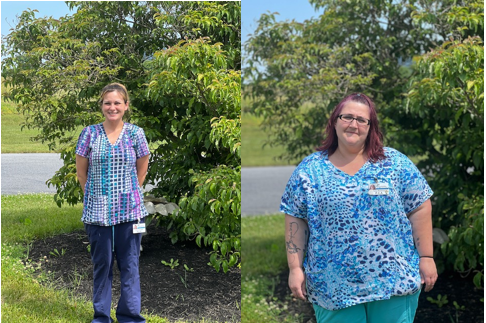Commitment + Clinical Leadership = Better Outcomes

The Positive Impact of PCAs
Personal Care Assistants (PCAs) work with individuals who need specialized care services, helping their residents perform everyday tasks such as getting dressed or moving across the building. PCAs generally work in settings with seniors such as nursing homes, retirement homes, clinics, doctor’s offices, care services, and social service agencies.
Many people enter the healthcare field for the first time as a PCA, and oftentimes they will study to become Certified Nursing Assistants (CNAs).
We interviewed two PCAs from Stonebridge Health and Rehabilitation Center who are studying to become CNAs: Tonya Bowersox and Jessica Reiner.
“I love my job at Stonebridge. When the residents are happy it melts my heart. Every day, we work together to help our residents, and I wouldn’t want to be anywhere else,” Bowersox said.
“Every day is a good day, and we have a great team here, from the nurses to physical therapy. Everyone is helpful and respectful of one another. It’s nice to have staff you can lean on to get through the day,” Reiner told us.
What does a normal day look like in your role?
“When I come in, I get a rundown of what’s happening today. For example, if someone fell or anything the night before, I make a note of that and inform the other Stonebridge Health and Rehabilitation Center team members. For the residents that have their lights on, I assure them I’ll be there. I then go down the list of who I need to see and help the other girls check in on the residents,” Bowersox answered.
“Our days are always busy. Typically, I will work in the rehabilitation hallway. We support each other, which helps everyone and prevents turnover,” Reiner said.
What is your favorite part about your job?
“I love seeing the residents happy, especially when they talk about their families. I like to see their smiles and enjoy it when they thank me because it makes me feel good about my job,” Bowersox said.
“My favorite part about my role is the residents. I enjoy helping them, getting to know them, and caring for them,” Reiner stated.
What is required to become a PCA transitioning to a CNA?
Currently, both Bowersox and Reiner are studying to become CNAs. They shared a little about the transition process from a PCA role to a CNA.
Reiner answered what they needed to do to become a PCA, “We had to complete an 8-hour course online, go through training, and went through on the floor training where we completed a certain amount of hours.”
Bowersox told us about the CNA test, “There are two tests – a written computer test and a skills test. In the skills test, they give us time to study and practice. We do some of the same stuff we do now, but we also check blood pressure and do other clinical tasks.”
What made you choose to work in long-term care?
“I’ve been in long-term care for 12 years. When my grandmother became sick with cancer, I took care of her. I watched the impact of the illness on her, and being there for someone who couldn’t help themselves made me feel important,” Bowersox explained. “My family also inspired me to choose this path. I am the fourth generation of CNAs in my family, with my grandmother and aunts also being CNAs.”
“It was during COVID when I worked in the activities department at the time. I could see the need for help on the floor with the residents, everyone needed support. I decided to become a PCA, and now I’m following up to become a CNA,” Reiner said.
What is one thing most people do not know about PCAs and their role?
“It can be hard, but we try not to let it affect how we take care of others. We always try to come in with a clear head because the residents don’t need the negativity around them. They can sense that, so we create a good atmosphere,” Bowersox told us. “We also never forget our residents and the impact they have made on our lives. They’re family to us.”
“Most people don’t know that we care about the residents while we’re there, and we continue to care about them when we leave,” Reiner answered.
What advice do you have for anyone looking to become a PCA in long-term care?
“Always have a heart, but don’t let that get to you. Sometimes, when you have a big heart and something happens, it gets sad. Allow yourself to have emotions. I recommend people become CNAs if they have the heart for it and want to help others,” Bowersox said.
“Anyone who wants to work in long-term care and become a nurse should be a CNA first. You should develop your kindness and compassion along with your people skills,” Reiner discussed.
What are you most proud of in your job?
“I’m proud of how I’ve overcome so much at Stonebridge Health and Rehabilitation Center and the residents and what makes them happy. If they’re happy, that makes me happy,” Bowersox stated.
“I feel valued every day in my role,” Reiner said.
We appreciate our PCAS!
Here at Saber Healthcare, we appreciate the care that our personal care assistants give our residents each day. They touch the lives of our residents in many positive ways and help them get the care that they need.
Saber Healthcare is an organization that provides services to more than 115 buildings across the states of Ohio, Pennsylvania, Virginia, North Carolina, Indiana, Delaware, and Florida. To join our team as a PCA, click here to search for jobs near you.
Saber Healthcare is an organization dedicated to providing consultant services to long-term care providers. This article is for informational purposes and is not meant to be seen as professional advice. Please consult with a medical expert before relying on the information provided.
